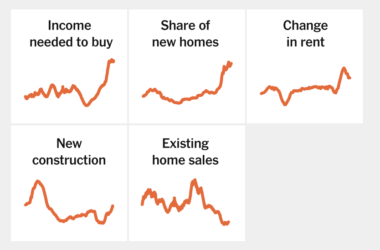Buyers lately have embraced “purchase now, pay later” loans as a straightforward, interest-free method to buy every thing from sweaters to live performance tickets.
The loans sometimes will not be reported on customers’ credit score stories, nevertheless, or mirrored of their credit score scores. That has stoked issues that customers is likely to be taking up an outsize quantity of debt that’s invisible to each lenders and monetary regulators.
So in February, when Apple introduced it will begin reporting loans made by its Apple Pay Later program to Experian, one of many three main U.S. credit score bureaus, it regarded like a watershed second for the fast-growing “purchase now, pay later” class.
However not one of the different main pay-later suppliers have adopted Apple’s lead. And whereas credit score bureaus and lenders say they’re taken with discovering a method to work collectively, the gulf between the 2 sides stays extensive — a lot in order that some pay-later companies are exploring creating another credit score bureau to deal with their loans.
“I haven’t seen actually significant progress,” mentioned David Sykes, chief business officer of Klarna, one of many largest pay-later companies.
“Purchase now, pay later” loans enable customers to pay for purchases over time, typically in 4 installments over six weeks, curiosity free. They surged in reputation throughout the pandemic, after they helped gasoline an online-shopping increase. The speedy development has continued: The retail trade attributed its record-setting vacation gross sales partly to the recognition of pay-later merchandise.
However economists at Wells Fargo warned final yr that “phantom debt” from pay-later loans “might create substantial issues for the patron and the broader financial system.”
The credit score bureaus argue that incorporating pay-later loans into the reporting system would profit customers, who might construct credit score by repaying the loans on time, and lenders, who would acquire fuller perception into customers’ borrowing.
The pay-later suppliers agree — in concept. However they fear that reporting the loans would find yourself hurting their prospects. Current scoring fashions penalize debtors who take out many loans in a brief interval. That might be an issue for the pay-later trade as a result of, not like bank card purchases, every pay-later transaction is handled as a mortgage.
Some client advocates share that concern.
“The credit score reporting system is a system that assumes month-to-month funds, it assumes longer-term loans, and it simply isn’t actually minimize out to deal with ‘purchase now, pay later,’” mentioned Chi Chi Wu, senior legal professional on the Nationwide Client Legislation Middle. “It’s a square-peg, round-hole form of factor.”
The patron reporting trade in the USA has advanced over the a long time to grow to be a posh net of impartial and typically competing gamers. Monetary establishments — banks, mortgage brokers, auto lenders and others — report data on loans to 3 main credit score bureaus: Equifax, Experian and TransUnion. These bureaus compile the info and supply it to lenders and customers, and in addition to firms like FICO and VantageScore, which use it to provide credit score scores.
The most important credit score bureaus say they addressed the pay-later trade’s issues greater than two years in the past after they created a class for the loans. That ought to enable FICO and VantageScore to regulate their fashions to account for these loans’ distinctive traits — and in the end to include them into credit score scores with out penalizing customers. (For now, the loans could be included on customers’ credit score stories however not seen to lenders or included into scoring fashions.)
“It’s been a protracted highway, however I believe that we’re lastly hitting a turning level within the momentum towards getting the info reported,” mentioned Liz Pagel, a senior vice chairman at TransUnion who oversees the corporate’s client lending enterprise.
The pay-later trade, nevertheless, argues that the credit-reporting system nonetheless isn’t prepared. For one factor, the credit score bureaus primarily obtain information from lenders month-to-month, whereas pay-later loans are sometimes paid biweekly. (All three main credit score bureaus mentioned that whereas month-to-month reporting was the default, lenders might report extra incessantly if they need.)
“It’s simply not fit-for-purpose but,” Mr. Sykes of Klarna mentioned. “And we haven’t seen something from the bureaus that recommend it’s about to be.”
Klarna stories loans to TransUnion and Experian in Britain, the place the system works considerably in a different way. A rival, Affirm, stories some longer-term loans to Experian in the USA and says it hopes to report shorter-term loans “finally.”
Different main pay-later suppliers, like Afterpay, PayPal and Zip, mentioned their issues with the credit score reporting system’s dealing with of pay-later loans had not been resolved.
“Our members proceed to say it’s nonetheless insufficient,” mentioned Penny Lee, president of the Monetary Know-how Affiliation, which represents most of the largest pay-later firms.
That argument took successful in February, nevertheless, when Apple introduced that it will start reporting loans made by its “Apple Pay Later” product — basically a duplicate of the pay-in-four loans supplied by Klarna, Afterpay and related companies — to Experian.
Apple declined to remark, however in an earlier information launch mentioned that whereas the loans wouldn’t instantly be included into credit score scores, it noticed the transfer as a step towards “offering customers with the chance to additional construct their credit score.”
Silvio Tavares, chief government of VantageScore, mentioned in an interview that Apple’s announcement confirmed the credit-reporting system’s capability to deal with pay-later loans.
“It’s robust to be extra subtle than Apple,” he mentioned.
Removed from becoming a member of Apple, nevertheless, pay-later suppliers look like exploring a system exterior the standard credit score reporting infrastructure. Final yr, two former trade executives based Qlarifi, a data-aggregation platform particularly for pay-later loans. (Mr. Sykes of Klarna is an investor.)
Alex Naughton, who left Klarna final yr to assist discovered Qlarifi and is now its chief government, portrays the corporate as a nimble, extra tech-savvy credit-reporting strategy. It will likely be in a position to acquire and share information in actual time slightly than month-to-month, the usual for the key credit score bureaus.
“I don’t suppose the present infrastructure is ready to adapt as shortly,” he mentioned.
The lenders and the credit score businesses agree that pay-later loans are unlikely to stay exterior the credit score scoring system perpetually. However it’s unclear what is going to break the logjam. Finally, trade specialists mentioned, it’ll in all probability boil all the way down to one in all two issues: Both regulators will pressure pay-later companies to begin reporting or market forces will.
“Both it’s going to be a market shift or it’s going to be a regulatory shift,” mentioned Shane Foster, a lawyer at Greenberg Traurig who focuses on monetary regulation.
Regulatory motion appears unlikely quickly, not less than on the federal stage. The Client Monetary Safety Bureau has hinted that it want to see pay-later loans included into the credit score reporting system. However whereas the company oversees the credit score reporting trade — imposing insurance policies to make sure that the info is correct and that client rights are protected — it hasn’t tried to require non-public firms to supply information to the bureaus.
A number of states, together with California, have taken motion to control the pay-later trade, and others, together with New York, are contemplating doing so. However these efforts wouldn’t instantly require the loans to be reported to credit score bureaus.
Banks and different conventional lenders report back to the credit score bureaus as a result of the info is useful in lending choices and since it gives a follow encourage debtors to repay: In the event that they don’t, their credit score scores will endure.
Pay-later suppliers might not really feel a lot strain to start reporting as a result of their enterprise is rising and most customers are making their funds, mentioned Ted Rossman, senior trade analyst at Bankrate. But when the financial system slows and extra customers begin falling behind on funds, lenders would possibly determine they should be part of the credit score reporting system to guage debtors’ reliability.
“Delinquencies are fairly low, the job market’s been stable, so perhaps that’s not created the identical urgency,” he mentioned. “‘Purchase now, pay later’ has but to have its actual delinquency reckoning. Folks hold warning about it. Possibly that can in the end be what spurs change right here.”




